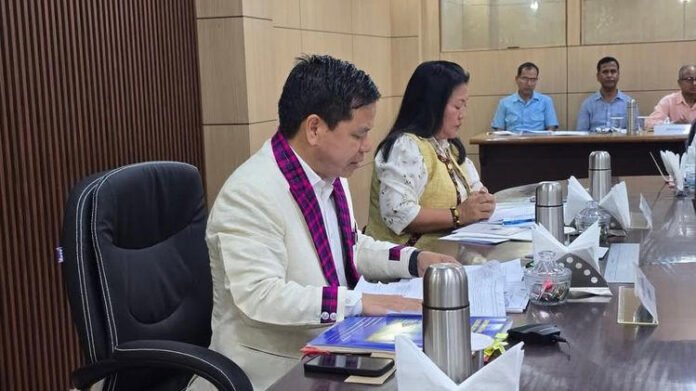The Committee on Government Assurances (CGA) of the Arunachal Pradesh Legislative Assembly conducted a comprehensive review of key administrative matters, including the status of major hydropower projects in the state.
The committee, chaired by MLA Dongru Siongju, met with top departmental officials and stakeholders in Itanagar this week to evaluate the progress of various assurances made by the government on the floor of the Assembly. The meeting highlighted the state government’s continued focus on infrastructure growth, sustainable energy development, and improved governance.
Read More: VIP Gallery Inaugurated at Rupa River Festival Ground in Arunachal’s West Kameng District
Hydropower Development Takes Center Stage
One of the core areas of review was the hydropower sector, which remains a top priority for Arunachal Pradesh due to its immense natural potential for generating clean energy.
The committee assessed the progress of several small and large-scale hydropower projects across the state, including those in districts like Tawang, West Siang, and Dibang Valley. Officials from the Department of Hydropower Development presented detailed updates on timelines, land acquisition, environmental clearances, and budget allocations.
Committee chairman Dongru Siongju emphasized that hydropower is not only vital for Arunachal’s energy security but also a key source of revenue and employment. He urged departments to speed up pending approvals and ensure that environmental and tribal consent processes are handled sensitively.
“Hydropower development must progress responsibly and inclusively. These projects will benefit the entire state, but local sentiments and ecological concerns must be addressed with care,” said Siongju during the session.
Focus on Fulfilling Assembly Assurances
The committee also reviewed the status of assurances made during previous Assembly sessions, especially those concerning rural development, infrastructure upgrades, and public service delivery.
Several departments were asked to provide updated timelines and completion reports on projects that were either delayed or partially implemented. The CGA stressed that accountability must be maintained and that people’s trust in the system can only grow when commitments are visibly fulfilled.
One of the key issues discussed included pending road connectivity projects in interior regions and the execution of health infrastructure in tribal-dominated districts.
The Health & Family Welfare Department, in particular, was directed to accelerate the ongoing upgrades of district hospitals and health sub-centers. The committee noted that delays in medical facility construction not only hamper service delivery but also affect the morale of the healthcare workforce.
Emphasis on Time-Bound Execution
In line with Chief Minister Pema Khandu’s governance mantra of “Work with Transparency and Speed,” the Government Assurance Committee advised all departments to maintain time-bound project implementation while also ensuring quality and compliance.
Members of the committee pointed out that repeated delays in public projects often erode public confidence and delay benefits to local communities. Departments were asked to strengthen monitoring systems and submit quarterly reports for better oversight.
Community Participation and Transparency Stressed
A recurring theme in the discussions was the need to increase community participation in project planning and execution. The committee encouraged departments to hold local consultations before finalizing large projects, especially in sectors like hydropower and infrastructure.
In addition, it called for better transparency in fund utilization, project tenders, and land compensation processes to avoid disputes and ensure smoother implementation.
The Arunachal Government Assurance Committee’s latest review reflects the state’s determined push for accountable governance and inclusive development. With hydropower projects acting as a catalyst for economic transformation, and other infrastructure priorities gaining momentum, Arunachal Pradesh is steadily positioning itself as a model for sustainable progress in Northeast India.
By holding departments accountable and encouraging people-centric policy execution, the committee is playing a pivotal role in bridging the gap between policy promises and grassroots impact.

